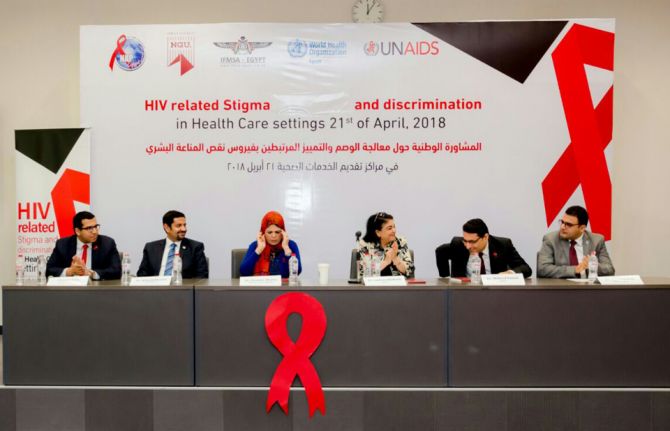

Feature Story
Egyptian medical students meet to address stigma and discrimination in health-care settings
25 April 2018
25 April 2018 25 April 2018Stigma and discrimination and other human rights violations occur in health-care settings worldwide, barring people from accessing health services or enjoying quality health care. Such stigma and discrimination further increases the vulnerability of people living with and affected by HIV.
To discuss this problem, nearly 300 Egyptian medical students, representing 18 universities across Egypt, met with representatives of academia, civil society, the government and the Egyptian Medical Syndicate. With support from UNAIDS, the Egyptian branch of the International Federation of Medical Students’ Associations held a one-day consultation on HIV-related stigma and discrimination in health-care settings on 21 April in Cairo, Egypt.
“People living with HIV should have equal rights and opportunities. Denial of access to health-care services is unacceptable. Through this consultation, we aim to inform our national strategy with new interventions for addressing stigma and discrimination,” said Walid Kamal, the National AIDS Programme Manager for Egypt.
During the consultation, the participants took stock of the progress made in addressing stigma and discrimination and decided to hold an ongoing dialogue to identify actions to address stigma and discrimination in health-care settings.
“We are witnessing an unprecedented opportunity for addressing discrimination in health-care settings with political support and programmatic vision. While resources are scarce, we count on the support of medical students as leaders of tomorrow and the power of volunteerism to address this issue,” said Ahmed Khamis, the UNAIDS Country Manager for Egypt.
The participants agreed that accountability mechanisms need to be in place to monitor and evaluate interventions, ensuring that proper actions are taken by the relevant authorities to address rights violations in health-care settings.
“Medical ethics is a must among health-care providers. The Egyptian Medical Syndicate is organizing workshops and conferences to enforce ethics among health-care providers. I would like to remind you all of the rights of patients,” said Sherine Ghaleb, representative of the Egyptian Medical Syndicate.
The participants agreed to prioritize launching the Ministry of Health and Population’s stigma-free policy and integrating HIV-related stigma and discrimination in the module on ethics taught to all doctors who graduate in Egypt. They also agreed to give access to the accountability and investigation mechanism of the Egyptian Medical Syndicate to civil society organizations and people living with HIV in order to report violations and to roll out information on post-exposure prophylaxis in the curricula of medical schools.
The recommendations made during the consultation were endorsed by the National AIDS Programme and will be included in Egypt’s road map for addressing HIV stigma and discrimination in health-care settings. Progress of the road map will be monitored by a group that includes a strong representation from people living with HIV.



